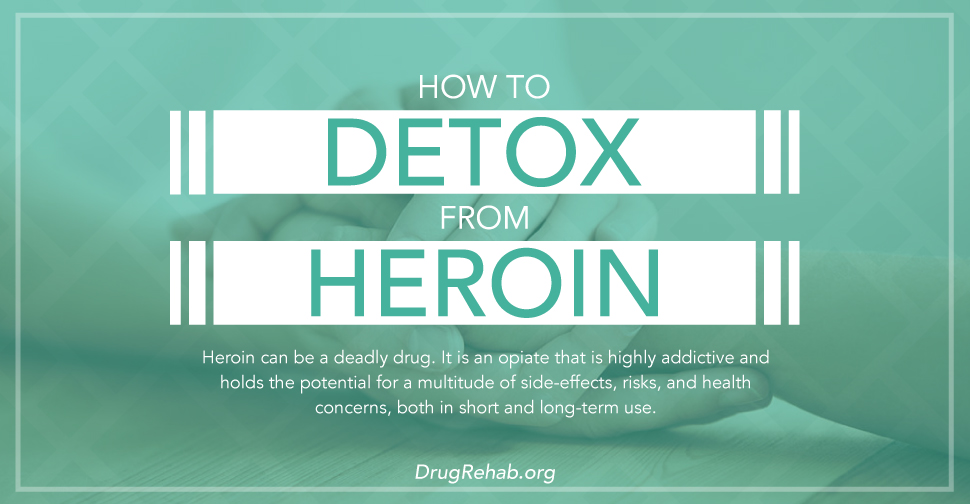
The Substance Abuse and Mental Health Services Administration reports on the 2014 National Survey on Drug Use and Health, stating that “Approximately 435,000 people were regular (past-month) users of heroin.” Though they do not specify how many of these individuals are addicted to heroin, it is safe to assume that due to its highly addictive nature, a significant portion of this number struggles with addiction. CNN reports that since 2007, heroin use has rose 145 percent. With this increased frequency comes a greater need for education and rehabilitation.
Stop Using Before The Risk Becomes Greater
Heroin can be a deadly drug. It is an opiate that is highly addictive and holds the potential for a multitude of side effects, risks, and health concerns, both in short- and long-term use. For this reason, if you or someone you love is using heroin—in any quantity or way—you need to stop, before the damage becomes even more severe.
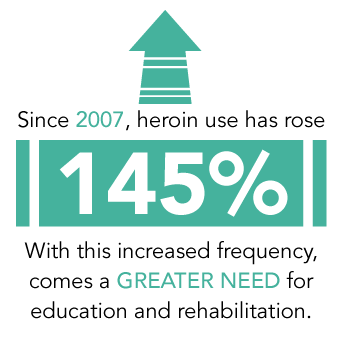
Though it is imperative that you stop using, you must realize that for those who suffer from a heroin addiction, quitting suddenly or “cold-turkey” is strongly advised against. Doing so will result in uncomfortable and overwhelming symptoms, as your body begins to withdrawal. Withdrawal occurs when your body and brain, which have become accustomed to the constant influx of the drug within critical systems, strongly react to its absence.
Symptoms Of Withdrawal
Withdrawal from heroin can be very unbearable, painful, and at times, very severe. Generally, symptoms of this “dopesickness” first arise roughly 6-12 hours from your last dose, reaching peak symptoms at 2-4 days, and tapering off within the course of a week. Withdrawal symptoms may include:
- Sweating
- Runny nose
- Yawning
- Dilated pupils
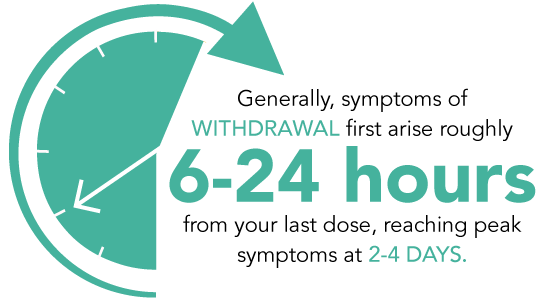 Chills and goosebumps, hence the term “cold turkey”
Chills and goosebumps, hence the term “cold turkey”- Nausea, diarrhea, and vomiting
- Abdominal pain
- Nervousness
- Agitation
- Trouble sleeping
- Shaking
- Muscle spasms
- Muscle and bone aches and pains
- Changes in blood pressure
- Increased heart rate
- Suppressed appetite
- Anxiety
- Feelings of depression
- Cravings that could lead to relapse
The latter symptom is especially important to consider. When a person finds themselves in the midst of the other uncontrollable side effects, many might consider using again, either due to cravings or in hopes of alleviating their discomfort. This is one reason why you should never attempt to detox from heroin on your own, in addition to the fact that it can be intolerable and even dangerous.
Seeking Support Through Withdrawal Is A Wise Decision
As heroin destructs your life, you’re faced with the stark reality of your drug addiction. This can be overwhelming and push a person towards using more drugs as an attempt to forget about the pain of their life. For this reason, if you truly desire to become drug-free, you should seek the management and expert guidance of a rehab center, which can help you to safely detox and heal from your addiction in other important ways.
Some people may think that they can detox on their own—which can be dangerous—or try their own ways to manage detox. The internet is rife with suggestions of how to do this. Be forewarned, these “home-fixes” can further complicate an already serious situation, and could compound the risk in serious ways. In the worse case, this could result in death or another addiction.
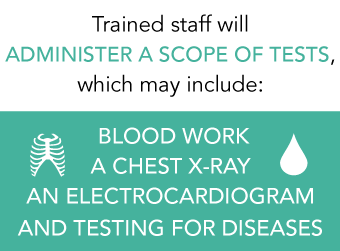 Undergoing medically-supervised detox helps you to avoid the most serious dangers. Within either a hospital or rehab facility, you will not have access to heroin, and instead will be supported by a trained and attentive staff who will seek to make you as comfortable as possible. To begin with, they will administer a scope of tests, which may include blood work, a chest x-ray, an electrocardiogram, and testing for diseases that are high-risk with heroin users, like hepatitis C and HIV.
Undergoing medically-supervised detox helps you to avoid the most serious dangers. Within either a hospital or rehab facility, you will not have access to heroin, and instead will be supported by a trained and attentive staff who will seek to make you as comfortable as possible. To begin with, they will administer a scope of tests, which may include blood work, a chest x-ray, an electrocardiogram, and testing for diseases that are high-risk with heroin users, like hepatitis C and HIV.
As a side-note, it can be very helpful to distract yourself while you’re detoxing. If you’re able to tolerate it, watching TV, reading, listening to soothing music, or interacting with people may help to somewhat displace your focus from the feelings caused by detox.
Your addiction support team will administer evidence-based, medication-assisted therapies within their heroin treatment protocol. Beginning with medications can help you to undergo detox in as safe and comfortable a manner as possible.
Medications That Can Help You With Detox
Some people may struggle with the notion of using a drug in place of another. It is important to realize that this is at times necessary, and makes the difference in not only your measure of comfort, but your success in finding sobriety.
An addiction, and the subsequent withdrawal, takes a massive toll on your body and mind. Medications and their controlled taper allow the addiction specialists to support you on these levels, helping to alleviate distress, and find an equilibrium that is most suitable for building your recovery.
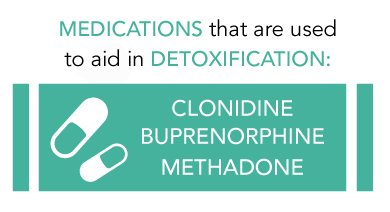
Research shows that these treatments work. Here we explain the medications that are used to aid in detoxification:
- Clonidine — According to MedLinePlus, this drug does not alleviate cravings, however it may aid in reducing “anxiety, agitation, muscle aches, sweating, runny nose, and cramping.”
- Buprenorphine — A partial opioid agonist, this drug treats withdrawal and works towards alleviating your cravings without creating the “high,” shortening the duration of detox. In the case of Suboxone there is naloxone, an opioid antagonist, which is added to prevent misuse by injection.
- Methadone — Due to its heavy regulation and stringent policies for use, this is most commonly used as a substitute medication and to treat withdrawal in inpatient treatment, and afterwards as a maintenance mediation.
Your medical support team may also administer other medications that can help you to relax or sleep.
As we’ve noted, heroin takes a toll on your body, to the extent that it can deplete your body’s vital nutritional resources. This is unfortunate, as going through detox is when your body most needs to be balanced and supported by these vitamins and minerals. Due to this, many programs will offer nutritional supplementation during detox, which some research suggests can help to temper symptoms of withdrawal. These may include vitamin C, B complex, and certain electrolytes, including calcium and magnesium.
Detoxing Is Only The First Step
It is important to remember that detoxing from heroin does not, in and of itself, grant a person a great enough foundation upon which to build their sobriety. This is simply the first step—one that cleanses your body, so that other intensive treatments and therapies can follow.
Heroin addiction is one of the most severe, for this reason it demands an intensive and in-depth approach, one that is best served in an inpatient drug rehab center. Though detox and treatment can occur in an outpatient setting, the evidence illustrates that a residential program is preferential to this route. Inpatient facilities offer you treatment in a residential setting, so that you might work towards your recovery with constant care, supervision, and comfort.
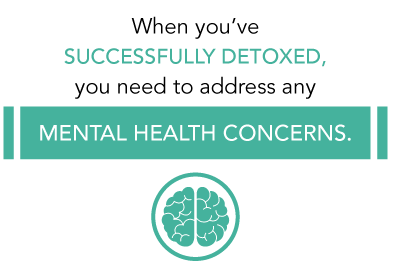 Some people may use heroin to escape as the euphoric feelings tend to cloud over negative thoughts and emotions or distract from other issues within life. This is only temporary and is a form of self-medication, which can be very dangerous. As a person descends deeper into it, the very conditions they seek to treat, such as anxiety and depression, can often get worse.
Some people may use heroin to escape as the euphoric feelings tend to cloud over negative thoughts and emotions or distract from other issues within life. This is only temporary and is a form of self-medication, which can be very dangerous. As a person descends deeper into it, the very conditions they seek to treat, such as anxiety and depression, can often get worse.
When you’ve successfully detoxed, you’ll need to address any mental health concerns or co-occurring disorders. Treating these with behavioral health therapies will allow you greater health, and a stronger foundation for long-lasting success.
When you’ve abused drugs to the point of addiction, you’ve likely let important parts of your life slip to the wayside, including your family, relationships, health, finances, job, and schooling. This can result in you feeling self-blame, self-hatred, self-loathing, or a sense of despair. A good treatment program should engage you in overcoming all of these things so you can detoxify your life, while learning to embrace positive coping skills and healthy decisions.
With your body clean of drugs, you need to work towards reinvesting in it. Within the context of a good program, you might be offered nutritional care, including dietary support and even some vitamin or mineral supplements, two things that can get you back on track towards wellness.
Become Clean And Healthy Today
 We want you to find sobriety in the best way possible. If you’d like to live a drug-free life, but are concerned about entering into withdrawal or a detox program, please contact us today. Our compassionate staff at DrugRehab.org can offer you even more information on this process and aid you in a finding a program that will best serve your needs.
We want you to find sobriety in the best way possible. If you’d like to live a drug-free life, but are concerned about entering into withdrawal or a detox program, please contact us today. Our compassionate staff at DrugRehab.org can offer you even more information on this process and aid you in a finding a program that will best serve your needs.
Sources
CNN — Worldwide drug use steady, but heroin on rise in U.S., U.N. report says
Substance Abuse and Mental Health Services Administration — Opioids
National Drug Strategy — Guidelines for the management of heroin withdrawal
American Family Physician — Management of Withdrawal Syndromes and Relapse Prevention in Drug and Alcohol Dependence
MedLinePlus — Opiate and opioid withdrawal

